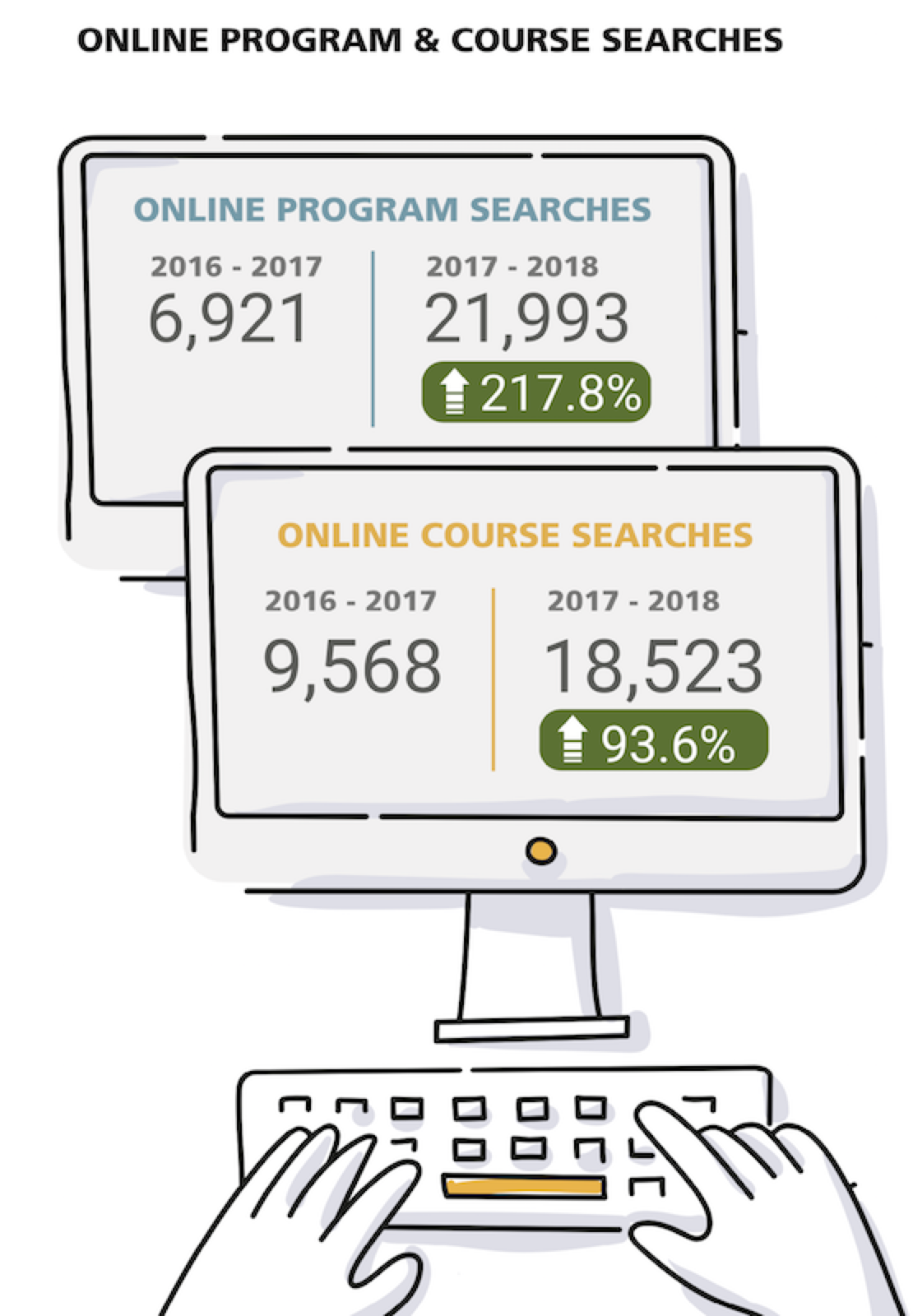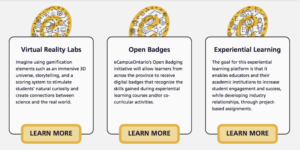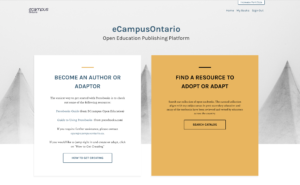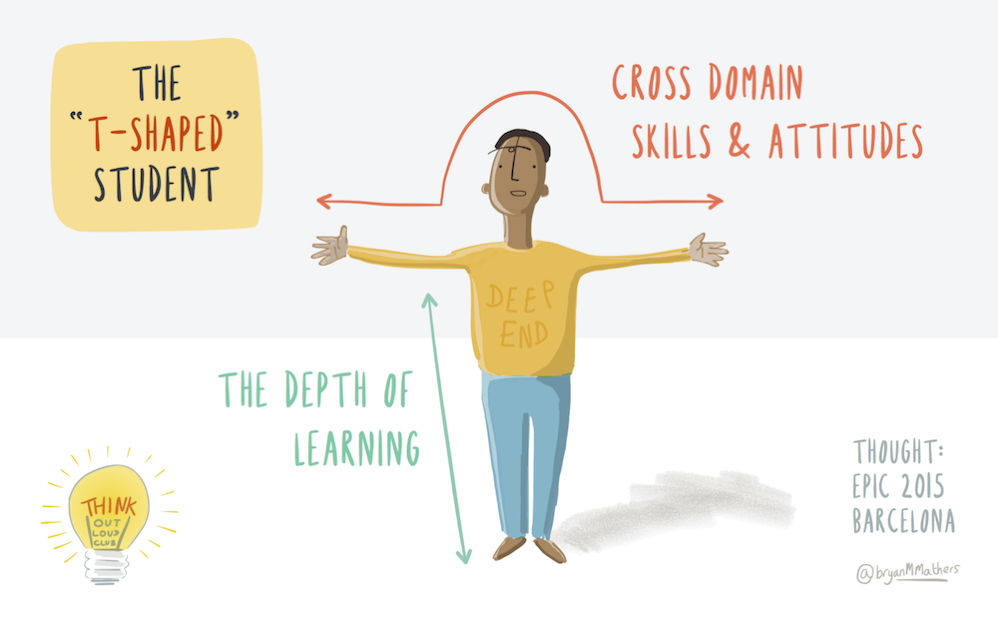
As I look ahead to the 2018-19 academic year, I see an exciting trajectory emerging for Ontario college and university students. On top of exemplary programs already on offer from our institutions, we are seeing growing interest from prospective students about flexible online pathways to skills and credentials that will provide them with a range of academic and career opportunities to pursue. And, our institutions are responding with vigour. In fact, we already have a running start.
We are seeing increasing activity across our member institutions as they continue to implement programs and courses in online and hybrid learning formats to better meet the needs of their students. We’re seeing growth across the spectrum of activity with more courses and programs adding technology-enabled features and affordances, with four clear themes standing out.
Technology-enabled learning is growing. It is available in formats ranging from fully-online courses, to blended online programs where in-classroom activities are paired with online or tech-enabled components for supplementary self-study, to hybrid models that intentionally seek to teach major portions of courses online and require fewer in-class sessions. All of these options are offered by Ontario post-secondary institutions and most can be found using the eCampusOntario search portal. As we look at the analytics from the eCampusOntario program and course search portal, all key indicators are up in 2017-18 and we expect to see further growth during the 2018-19 academic year.
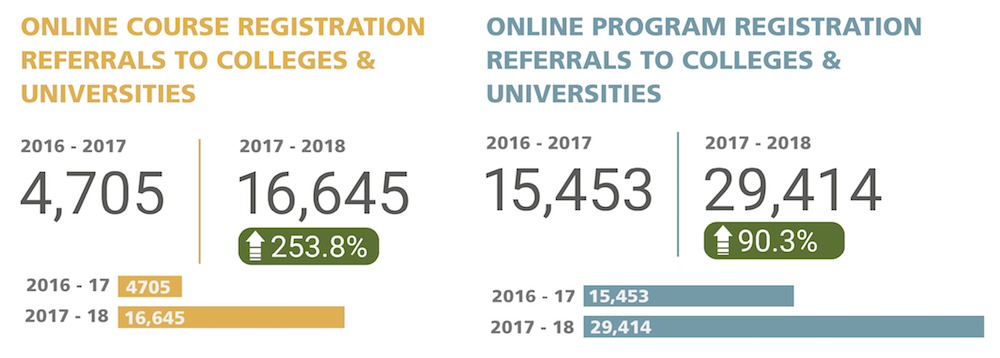
Experiential learning continues be a focus across post-secondary institutions. Co-op programs, work-integrated learning (WIL) and student practicums are just three of the ways in which meaningful learning experiences in the world of work can be provided for students while they’re still in school. Our focus at eCampusOntario has been on how we enable the concept of the T-Shaped Student for all post-secondary learners, supplementing the already rich experiences and skills they obtain in their programs, with cross-domain skills of the type many feel they need to differentiate themselves in hiring situations beyond college or university.
One of the questions still needing an answer is how to scale experiential learning in programs or courses where there is no existing formal connection to co-op programs or WIL. We believe that a technological solution is needed to scale access to experiences, while continuing to preserve the critical bond between faculty and students engaged in employer-sponsored work-related projects that dovetail with curricular outcomes. The eCampusOntario Tech Sandbox has been used by institutions to test their ideas with tools that might support scalable approaches to experiences and recognition of learning beyond classrooms. Our work with Riipen.com and CanCred.ca to prototype and test approaches to experiential learning services and recognition will be evaluated through institution reports that are being prepared for August 31, 2018.
Shared and collaborative services is another key focus for eCampusOntario and its member institutions. One of the tech programs we’ve helped install across all Ontario public post-secondary institutions is Lynda.com, a video-based skills training environment for self-study to supplement courses that students take and skills they will need. We’re already detecting patterns of interest from students. Through a partnership with the Higher Education Quality Council of Ontario (HEQCO), to conduct preliminary research to better understand patterns of use, we are collecting direct feedback from students to help inform implementation and curricular integration opportunities across Ontario colleges and universities.
Other shared services are being planned. Informed by focus groups and a survey of all public post-secondary institutions, we have identified the top five candidate technologies for expanded shared service support across our post-secondary institutions. The report will be published in September 2018, but a preview of the Top-5 candidate technologies is already evident from the early focus group and survey results. They include:
- Captioning and transcription services
- Learning analytics
- Virtual labs
- Academic integrity software
- Virtual simulations (Virtual and Augmented Reality)
We’ll be exploring next steps with institutions in fall 2018. We’ll start by designing a lifecycle strategy for educational technology services that will include exploration (Sandbox), evaluation, operations planning, pricing structures, procurement, and service models . Our lifecycle approach will also be considering a sunsetting process for shared educational technologies that need replacement.
Open by design is hallmark of eCampusOntario’s initiatives. We have been proactive in supporting an affordability strategy for students by making available a growing library of open textbooks and open educational resources (OER) created or adapted by faculty. Our new open textbook library, created in partnership with Ryerson University, is undergoing an upgrade and facelift in fall 2018 to integrate it more closely with our other web properties including the learnonline.ecampusontario.ca search portal, so that open textbooks can be featured alongside courses in which they are used.
The new open library will be coupled to the Pressbook.education site that is dedicated to Ontario faculty and instructors. We have the capability for a complete OER workflow, including book cloning functions, embedded scientific notation, and a set of interactive activities for students that can be embedded within open textbooks using the open source H5P software that we have worked with Pressbooks to implement for educators.
The Pressbooks authoring platform is available to all of our college and university members with the following benefits:
- Easy to use authoring platform with embedded features like H5P
- Consistent template formats and authoring standards across Ontario to ensure adaptability
- Opportunities for capacity-building at the institution level through libraries and teaching and learning centres
All of these innovations point to a sustainable OER future in Ontario
We share
eCampusOntario is committed to bringing new programs and services to its member institutions. In addition, we will begin to share research reports, survey data and analytical data that together will contribute to an expanding knowledge base for Ontario educators and will provide additional opportunities for Ontario students to find and select flexible learning pathways that match their needs and their lives.


